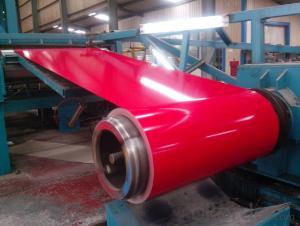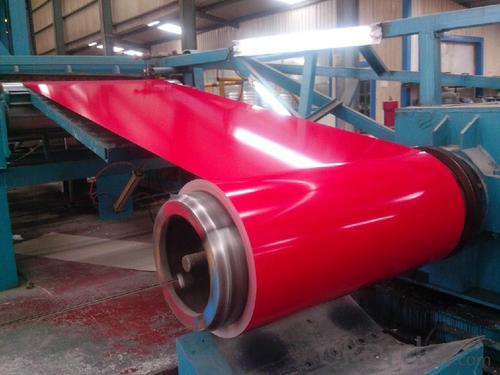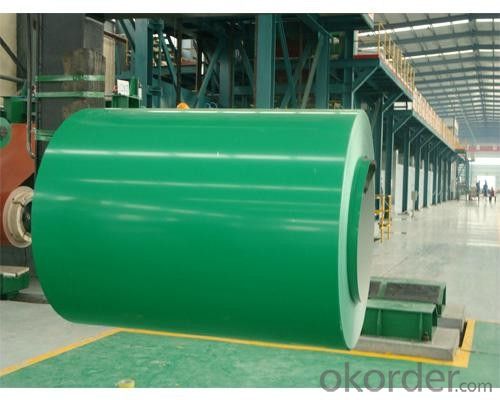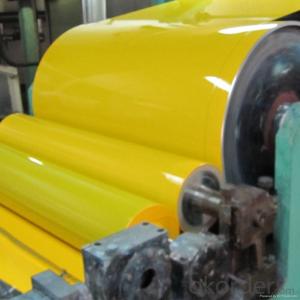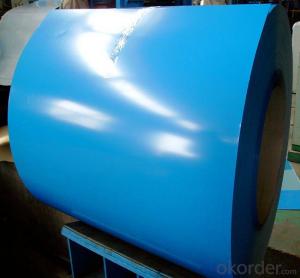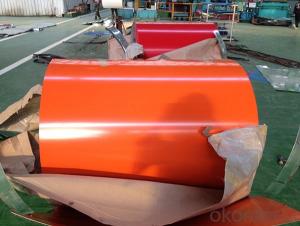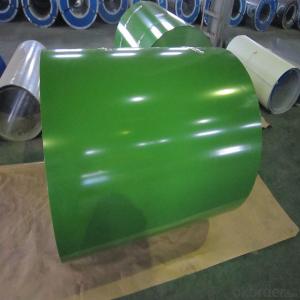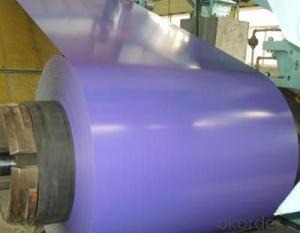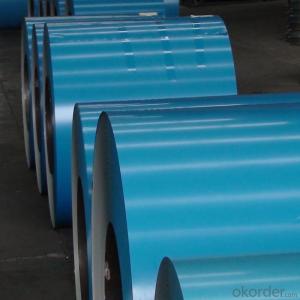Prepainted Aluminum Zinc rolled Coil for Construction Roof
- Loading Port:
- Shanghai
- Payment Terms:
- TT OR LC
- Min Order Qty:
- 25 m.t.
- Supply Capability:
- 30000 m.t./month
OKorder Service Pledge
OKorder Financial Service
You Might Also Like
Structure of Aluminum Zinc Rolled Coil
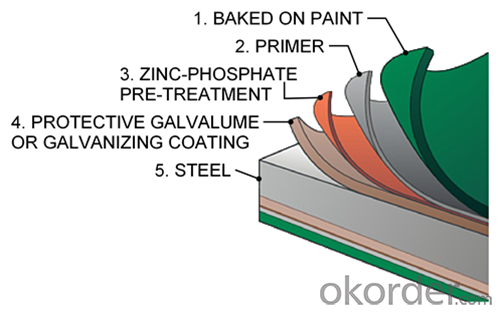
Description of Aluminum Zinc Rolled Coil
Aluminum zinc coils is a kind of coated steel coil/sheet. With the cold rolled steel of different strength and thickness as substrate, it is produced through applying Al-Zn coat on both faces by hot dip process. In its coating, Al accounts for about 55%, Si 1.6%, while the remaining is Zn. Aluminum zinc coils enjoys both the physical protective feature and durability of Al and the electrochemical protective property of Zn. And its surface has bright silver color and regular embossed-like figure, which are highly decorative.
Main Feature of Aluminum Zinc Rolled Coil for Construction Roof
1.Corrosion resistance: It mainly depends on the aluminum protection. When the zinc being worn, the aluminum will form a dense layer of aluminum oxide, resist corrosion material to prevent further corrosion inside.
2. Heat resistance: Aluminum zinc alloy steel sheet has excellent heat resistance, can withstand high temperatures over 300 centigrade, and is similar with aluminized steel high temperature oxidation resistance. It often used in chimney pipes, ovens, fluorescent lighting device and the device cover.
3. Heat reflective: Galvanized steel plate heat-reflective high rate is twice as galvanized steel, often used to make insulation materials.
4. Economy: Because density of 55% AL-Zn is smaller than the density of Zn, so in the same weight and thickness of Galvanized zinc layer, aluminum-zinc steel plate is larger area more than 3% of galvanized steel sheet.
Applications of Aluminum Zinc Rolled Coil for Construction Roof
1. Construction and building: roofing; ventilating duct; handrail; partition panel;etc.
2. Electric appliance: refrigerator; washing machine; refrigerator; DVD;etc.
3.Transportation: oil tank; road sign; etc.
4.Agriculture:barn; etc.
5.Others:vending machine; game machine; etc.
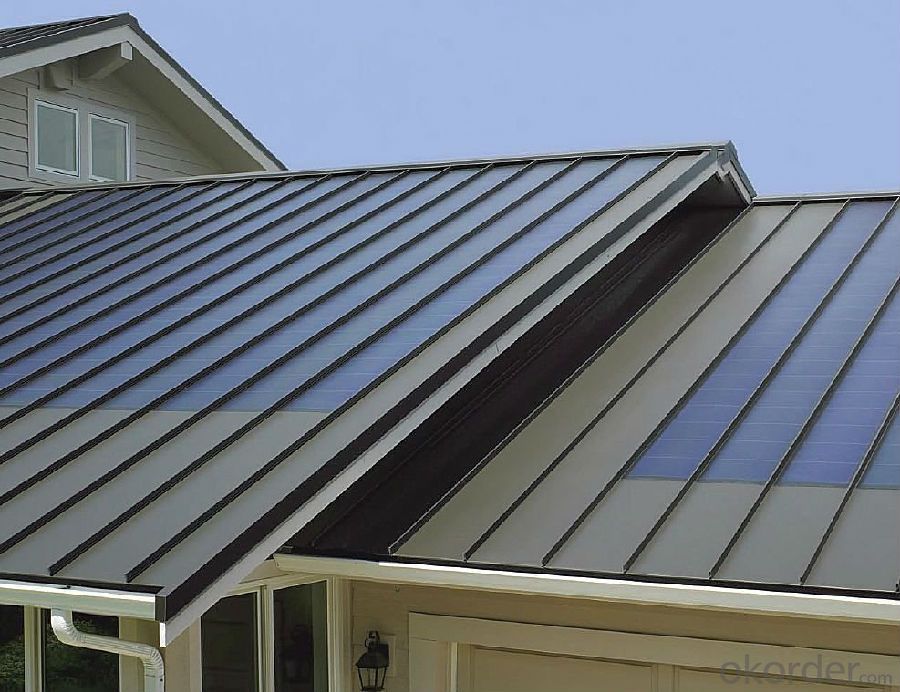
Prepainted Aluminum Zinc Rolled Coil for Construction Images
Specifications of Prepainted Aluminum Zinc Rolled Coil for Construction
Chemical Composition | ||||||
GRADE | C | Si | Mn | P | S | Ti |
SGCC/DX51D+Z | ≤0.10 | ≤0.50 | ≤0.60 | ≤0.10 | ≤0.030 | ≤0.020 |
DX52D+Z | ≤0.10 | ≤0.50 | ≤0.60 | ≤0.10 | ≤0.030 | ≤0.020 |
SGCD/DX53D+Z | ≤0.10 | ≤0.30 | ≤0.50 | ≤0.05 | ≤0.030 | ≤0.020 |
SGCE/DX54D+Z | ≤0.10 | ≤0.30 | ≤0.30 | ≤0.03 | ≤0.020 | ≤0.020 |
DX56D+Z | ≤0.10 | ≤0.30 | ≤0.30 | ≤0.03 | ≤0.020 | ≤0.020 |
Structural | ≤0.20 | ≤0.60 | ≤1.70 | ≤0.10 | ≤0.045 | |
Mechanical Properties | ||||||
GRADE | Yield Strength MPa | Tensile Strength MPa | Elongation % | |||
SGCC(DX51D+Z) | ≥205 | ≥270 | - | |||
SGCD(DX53D+Z) | - | ≥270 | 38 | |||
SGCE(DX54D+Z) | - | ≥270 | 40 | |||
DX56D+Z | - | ≥270 | 42 | |||
FAQ of Prepainted Aluminum Zinc Rolled Coil for Construction
We have organized several common questions for our clients,may help you sincerely:
1. What is the minimum order quantity ?
Our MOQ is 50mt for each size. And we will consider to give more discount if you make big order like 1000 tons and more. Further more, the more appropriate payment term your offer the better price we can provide.
2. How long can we receive the product after purchase?
Usually within thirty working days after receiving buyer’s advance payment or LC. We will arrange the factory manufacturing as soon as possible. The cargo readiness usually takes 15-25 days, but the shipment will depend on the vessel situation.
3. How to guarantee the quality of the products?
We have established the international advanced quality management system,every link from raw material to final product we have strict quality test;We resolutely put an end to unqualified products flowing into the market. At the same time, we will provide necessary follow-up service assurance.
- Q: What are the applications of steel coils?
- Steel coils have a wide range of applications across various industries, such as construction, automotive, appliances, and manufacturing. They are primarily used in the production of sheet metal, pipes, and tubes, as well as for manufacturing parts and components. Steel coils are also used in the fabrication of various structures, including buildings, bridges, and infrastructure projects. Additionally, they find use in the production of household appliances, vehicles, machinery, and other consumer goods.
- Q: What are the different types of steel coil loading and unloading methods used during processing?
- There are several different methods used for loading and unloading steel coils during processing. Some common methods include overhead crane lifting, forklift transportation, coil cars, and coil transfer cars. Each method has its own advantages and is chosen based on factors such as the size and weight of the coils, the available equipment, and the layout of the facility.
- Q: What are the dimensions of steel coils?
- The dimensions of steel coils vary depending on factors such as the specific type of steel, the intended use, and industry standards. Generally, steel coils can range in width from a few inches to several feet, with thicknesses typically ranging from a fraction of an inch to several millimeters. The inner diameter of a steel coil can also vary, with common sizes being 20 inches and 24 inches. Ultimately, the dimensions of steel coils are determined by the specific needs and requirements of the end user.
- Q: I have a Nike SQ Sumo 21 degree and it is a steel shaft. I hit the ball very high with this club and I lose distance. I don't hit any of my other clubs high it's just this one. Is it because of the steel shaft or is it the club? Help please.
- Actually it isnt so much whether its steel or graphite, although in the past steel was stiffer as a rule. Today many graphite shafts (depending on the shaft manufacturer) are in fact stiffer then some steel shafts. IE proforce XS vs true temper R You also have to look at the kick point in the shaft. The kick point is where the shaft bends at moment of impact. My shafts are tipped lower because I custom made them that way because I typically hit the ball low to begin with. High kick point means lower ball flight and lower means a higher flight. Also different brands have different stiffness' some regular shafts you'll find feel stiffer then other stiff shafts. the only way to tell if its the shaft is to have all the same shafts installed with the same kickpoint hope this helps
- Q: Can steel coils be coated with zinc-aluminum alloy?
- Yes, steel coils can be coated with a zinc-aluminum alloy through a process called hot-dip galvanizing. This coating provides enhanced corrosion resistance and improved durability to the steel coils.
- Q: I'm missing the arguement, and I've seen another question like this... but the steel toe issue has 2 scenario's right?... Let me label them out, the 2nd is the one that no one talks about?Note to anyone - how are your catapillar boots, your wolverines, and then your cheap walmart/sears brands?1. Steel toe on, toes get cut off because of something falling on them. OUCH!.. Reattach perhaps?2. This one is what I question. No steel toe, large object falls on toes. SMASH... Pudding in your shoes.Wouldn't it be safer to say you'de be better off with a steel toe?
- You're talking worst case scenarios here man. The steel toe isn't for parking tractors on, it's to keep you going when everything less than catastrophic occurs. It's like safety goggles protecting a person's eyes. They work great, but only to a point...
- Q: How are steel coils processed for different levels of hardness?
- Different levels of hardness can be attained in steel coils using a variety of methods. One common approach is heat treatment, in which the coils are heated to a specific temperature and then rapidly cooled to modify their microstructure and achieve the desired hardness. The heat treatment process can encompass quenching, tempering, or annealing, depending on the desired hardness level. Quenching involves quick cooling of the coils in a liquid medium like water or oil to achieve a high hardness level. On the other hand, tempering requires reheating the coils to a lower temperature and gradually cooling them to attain a desired balance between hardness and toughness. Annealing, on the other hand, involves heating the coils to a specific temperature followed by slow cooling to release internal stresses and obtain a softer and more malleable material. Additionally, mechanical processes like cold rolling or cold working can be employed to enhance the hardness of steel coils. These processes involve applying compressive forces to the coils, causing the material to deform and resulting in increased hardness. Overall, achieving different hardness levels in steel coils requires meticulous control of temperature, cooling rate, and mechanical forces to obtain the desired properties for specific applications.
- Q: i recently got an industrial piercing and instead of getting pierced with a metal bar i have a PTFE bar .. i eventually want to put in a metal bar but what kind do i get? whats the difference between a surgical steel and titanium bar?thanks
- Surgical steel is fine, titanium is by far the most superior metal though. I've found that piercings done with titanium as opposed to surgical steel have healed a lot easier. But keep in mind that if you just got the piercing you've got quite some time before you'll be able to change it.
- Q: How are steel coils used in the production of steel pipes?
- Steel coils are used in the production of steel pipes by being unwound and fed through a series of rollers that shape and weld the steel into a seamless or welded pipe.
- Q: How are steel coils used in the manufacturing of industrial equipment?
- Due to their versatility and strength, steel coils find common application in the manufacturing of industrial equipment. Typically crafted from high-quality steel, these coils are shaped into a coiled form for convenient transportation and storage purposes. One of the primary purposes of steel coils in the manufacturing of industrial equipment is the creation of structural components. Often, these coils are cut, shaped, and welded to produce various parts and structures that offer support and stability to the equipment. For instance, frames, beams, and brackets, which serve as the backbone of heavy machinery, can be constructed using steel coils. Moreover, steel coils are utilized in the production of mechanical components like gears, shafts, and bearings. These components necessitate high strength and durability to withstand the demanding loads and harsh conditions encountered in industrial settings. By employing steel coils, manufacturers can ensure that these parts possess the requisite strength and resilience for reliable performance. Additionally, steel coils are incorporated into the manufacturing of equipment surfaces that require corrosion resistance or aesthetic appeal. Steel with specific coatings or finishes can be rolled into coils to create sheets or plates, which are employed in constructing outer casings, panels, or covers for industrial equipment. These coatings not only protect the equipment from environmental factors but also enhance its visual appeal. Furthermore, steel coils can be transformed into pipes and tubes, which are essential components in numerous industrial applications. These pipes serve the purpose of transporting various fluids, gases, or materials within the equipment. The strength and structural integrity of steel coils guarantee that the pipes can endure high pressure, temperature, and mechanical stress, rendering them suitable for demanding industrial environments. In summary, steel coils occupy a vital role in the manufacturing of industrial equipment. They are utilized in fabricating structural components, mechanical parts, surface finishes, and pipes. The versatility, strength, and durability exhibited by steel coils make them the preferred choice in the industrial equipment manufacturing industry.
Send your message to us
Prepainted Aluminum Zinc rolled Coil for Construction Roof
- Loading Port:
- Shanghai
- Payment Terms:
- TT OR LC
- Min Order Qty:
- 25 m.t.
- Supply Capability:
- 30000 m.t./month
OKorder Service Pledge
OKorder Financial Service
Similar products
Hot products
Hot Searches
Related keywords
